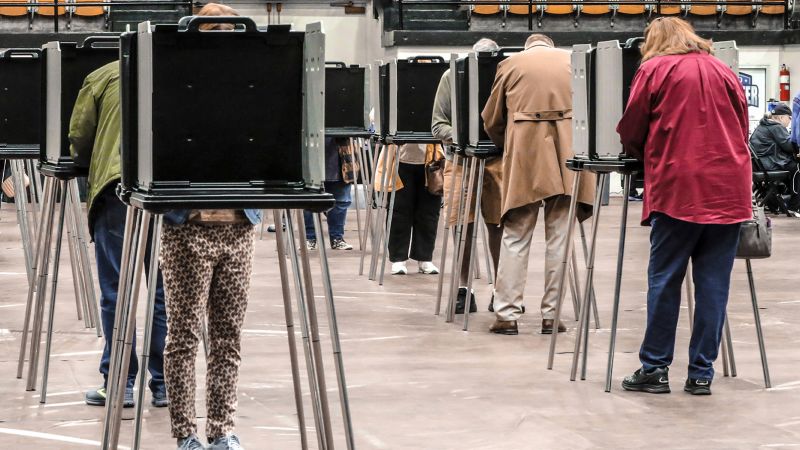Abortion rights are on the ballot Tuesday as Americans head to the polls for state and local races that will set the stage for next year’s presidential election.
Fiercely fought contests in Kentucky, Pennsylvania, Virginia and Ohio could offer a 2024 roadmap for both parties.
Democrats have largely succeeded in running on the issue in the aftermath of the Supreme Court’s decision last year to overturn Roe v. Wade, which effectively punted abortion law to the states. For the most part, they have done so by framing the debate as one of personal freedom – and leaving Republicans to haggle over the politically painful particulars.
A victory for abortion rights advocates in Ohio – where voters could enshrine a constitutional amendment protecting abortion access – along with success in high-stakes races for governor, the state Supreme Court and control of the state legislature in other states, could further demonstrate the potency of the issue.
Meanwhile, the gubernatorial election in Mississippi asks a different question: Is it still possible for a Democrat to win a statewide race in the deepest of deep-red states?
Republican Gov. Tate Reeves, who is seeking a second term, is knee-deep in a corruption scandal as the state faces another health-care crisis. Democrat Brandon Presley is banking on Reeves’ foibles, a famous name – Elvis Presley was a second cousin – and a promise to expand Medicaid while cutting regressive grocery taxes. (Both oppose abortion rights.)
Other intense – and expensive – campaigns will be decided in Pennsylvania, where abortion is again top of mind with a seat on the state Supreme Court in the balance, and in New Jersey and New York, where Democrats’ strength will be tested.
Philadelphia and Houston will also go to the polls to elect new mayors. Former City Councilmember Cherelle Parker is poised to become Philadelphia’s first female mayor, while Rep. Sheila Jackson Lee is running neck-and-neck with state Sen. John Whitmire in Houston. That race could go to a run-off.
And in Rhode Island, favored Democrat Gabe Amo and Republican Gerry Leonard square off in a special election to complete the term of Democratic former Rep. David Cicilline.
Here are six things to watch for during Tuesday’s elections:
All 140 seats in the state’s Senate and House of Delegates are being contested in Virginia’s legislative elections Tuesday, but the biggest name in the race is one that won’t appear on the ballot.
Virginia Gov. Glenn Youngkin has pulled out all the stops to help Republicans flip control of the Senate, where Democrats hold a narrow majority, and hold on to the House of Delegates, where Republicans hold a similar advantage. He endorsed in key primaries, launched a bus tour to promote early voting and raised a stunning $18.7 million through his leadership PAC, Spirit of Virginia, thanks in large part to speculation that he could launch a last-minute entry into the Republican presidential primary if he has a good Tuesday.
Youngkin has emphasized education, public safety and the economy in his ads, urging Virginians to send Republicans to Richmond to help him further his agenda. He’s also pitched a 15-week abortion limit, with exceptions for rape, incest and to protect the life of the patient, which he says is a consensus opinion. Democrats have focused on abortion as well, calling the 15-week limit a ban, as well as arguing Republicans will roll back progressive policies on voting rights and climate change that they passed when they briefly held control after the 2019 elections.
As for Youngkin’s future? He has said that he’s focused on Virginia’s elections, but that hasn’t slowed speculation about what’s next. Still, should Republicans win full control of the state government on Tuesday, don’t automatically expect that to mean the state has fully flipped red – it hasn’t voted for a Republican in the last four presidential cycles.
The 2022 midterm elections showed that when abortion rights are on the ballot, voters overwhelmingly favored protecting or expanding access. Ohio could upend that narrative.
Voter will either pass Issue 1 – an initiative that would enshrine abortion rights in the state’s constitution – or hand abortion rights advocates one of their biggest defeats since the Supreme Court’s Dobbs decision.
Abortion rights groups have argued Issue 1 is the only way to stop the state’s six-week abortion ban, which includes no exceptions for rape or incest, from being enforced. The law was blocked in court last year but is now being considered by the state Supreme Court.
Abortion opponents — including Republican Gov. Mike DeWine, who signed the six-week ban into law — have argued that Issue 1 goes too far and would prevent Republicans from passing a compromise bill.
This is the only abortion rights ballot initiative before voters this year. If Issue 1’s backers win, it would further suggest that abortion access is popular, even in red states, and motivate advocates looking to get similar measures on the ballot in 2024. If voters reject Issue 1, it would signal to abortion opponents that there’s a path to blocking these measures after all.
Kentucky Gov. Andy Beshear, one of the few remaining red-state Democratic leaders, is running for a second term against GOP state Attorney General Daniel Cameron, a Trump-backed conservative.
Though not explicitly on the ballot, abortion has featured prominently in the campaign, with Beshear arguing that Cameron will double down on the commonwealth’s already harsh restrictions.
Beshear has good reason to hammer away at the issue. A year ago, Kentucky voters rejected a ballot measure that would have denied constitutional protections for abortion.
Cameron has said he would support legislation broadening exceptions to the current ban – one of the strictest in the country – if lawmakers brought it his desk, but Beshear in a debate noted that Cameron had signed a Kentucky Right to Life survey saying he opposed them.
If Cameron does pull out a victory over Beshear, he will become the state’s first Black governor – and the first elected Black Republican governor in US history.
A year after Democrat John Fetterman made abortion rights a focus of his winning Senate campaign over GOP nominee Mehmet Oz, Pennsylvania Democrats are going all-in for state Supreme Court candidate Daniel McCaffery.
The seat, which opened after the death last year of Democratic Chief Justice Max Baer, could be crucial to determining the future of abortion rights in the commonwealth, where the issue is poised to come before the court.
Democrats hold a 4-2 advantage on the bench, but a win Tuesday for Republican nominee Carolyn Carluccio would narrow the margin ahead of elections in 2025, when three Democratic incumbents are up for reelection.
From the start of this gubernatorial election, long-standing dynamics of Mississippi have been at play. Incumbent Gov. Tate Reeves, a Republican, has had to run under the cloud of a scandal involving former NFL quarterback Brett Favre and concerning the misappropriation of millions of dollars of public funds meant for welfare recipients around the state.
Tate faces Mississippi Public Service Commissioner Brandon Presley, second cousin of Elvis Presley who has framed his candidacy around a populist emphasis on kitchen-table issues. Presley is hoping that focusing on building a coalition of Black voters, disaffected Republicans and Southern Democrats can propel him to the Mississippi Governor’s Mansion. If Presley wins, it would be the first time in over two decades that a Democrat was elected governor in the Southern state.
Still, it’s an uphill battle for Presley. Mississippi consistently trends Republican, and even an anti-abortion Democrat with a marquee surname in the state is not ensured an easy path to victory. Most polling has shown Reeves in the lead.
The underlying theme of this race is whether a battered incumbent Republican incumbent could lose to a Democrat playing the old Southern Democrat approach to Mississippi politics.
Democratic dry run in NY and NJ
Democrats in the Northeast have shown signs of weakness over the past two elections, with the governors of New York and New Jersey both winning their races by narrower-than-expected margins and the New York GOP making major gains in the Gotham suburbs.
That nudge to the right was largely driven by strong Republican messaging on crime and the economy – strategies that will again be tested on Tuesday, when every seat in the New Jersey Legislature and New York City Council, respectively, will be up for grabs.
Democrats control all those bodies and, barring a major shock, will retain their power. The question: Can Republicans narrow the margins and send a message to the country ahead of the 2024 campaign?
Read the full article here





